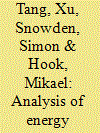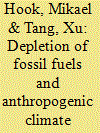| Srl | Item |
| 1 |
ID:
121377


|
|
|
|
|
| Publication |
2013.
|
| Summary/Abstract |
Interest in the role embodied energy plays in international trade and its subsequent impact on energy security has grown. As a developed nation, the UK's economic structure has changed from that of a primary producer to that of a primary consumer. Although the UK's energy consumption appears to have peaked, it imports a lot of energy embodied in international trade alongside the more obvious direct energy imports. The UK has seen increasing dependency on imported fossil energy since the UK became a net energy importer in 2005. In this paper an energy input-output model is established to calculate not only the amount of fossil energy embodied in UK's imports and exports, but also the sector and country distributions of those embodied fossil energy. The research results suggest the following: UK's embodied fossil energy imports have exceeded embodied fossil energy exports every year since 1997, UK embodied energy imports through the so-called 'Made in China' phenomena are the largest accounting for 43% of total net fossil energy imports. If net embodied fossil energy imports are considered, the gap between energy consumption and production in UK is much larger than commonly perceived, with subsequent implications to the UK's energy security.
|
|
|
|
|
|
|
|
|
|
|
|
|
|
|
|
| 2 |
ID:
117293


|
|
|
|
|
| Publication |
2013.
|
| Summary/Abstract |
Future scenarios with significant anthropogenic climate change also display large increases in world production of fossil fuels, the principal CO2 emission source. Meanwhile, fossil fuel depletion has also been identified as a future challenge. This chapter reviews the connection between these two issues and concludes that limits to availability of fossil fuels will set a limit for mankind's ability to affect the climate. However, this limit is unclear as various studies have reached quite different conclusions regarding future atmospheric CO2 concentrations caused by fossil fuel limitations.
It is concluded that the current set of emission scenarios used by the IPCC and others is perforated by optimistic expectations on future fossil fuel production that are improbable or even unrealistic. The current situation, where climate models largely rely on emission scenarios detached from the reality of supply and its inherent problems are problematic. In fact, it may even mislead planners and politicians into making decisions that mitigate one problem but make the other one worse. It is important to understand that the fossil energy problem and the anthropogenic climate change problem are tightly connected and need to be treated as two interwoven challenges necessitating a holistic solution.
|
|
|
|
|
|
|
|
|
|
|
|
|
|
|
|